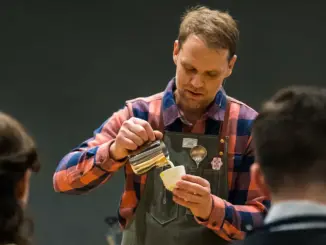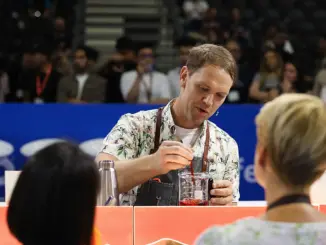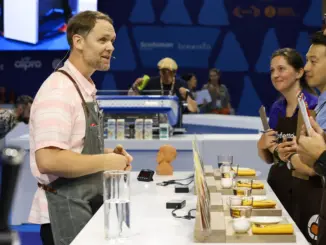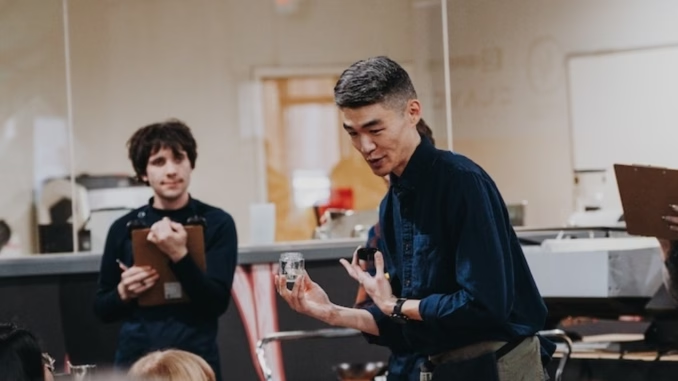
In his sixth year competing and fourth time in the finals, Kay Cheon broke through to become the newest U.S. Barista Champion.
BY CHRIS RYAN
BARISTA MAGAZINE ONLINE
Featured photo courtesy of Onyx Coffee Lab
In 2018, as a young coffee professional working at Santa Barbara, Calif.’s Dune Coffee Roasters, Kay Cheon surprised himself. Taking part in his first U.S. Barista Championship (USBC) season, he reached the finals of the national competition, ultimately placing third.
In the ensuing years, Kay has been a mainstay of competition, and a reliable entrant into the USBC finals—before 2025, he had competed in five seasons and reached three USBC finals. He has also taken strategic breaks from competition, including judging at the 2022 USBC in Boston, which Kay describes as what he needed in that moment to grow as a competitor. “Having an understanding of what it feels like to be sitting at the judges’ table is so important to be able to create a strong presentation,” he says.
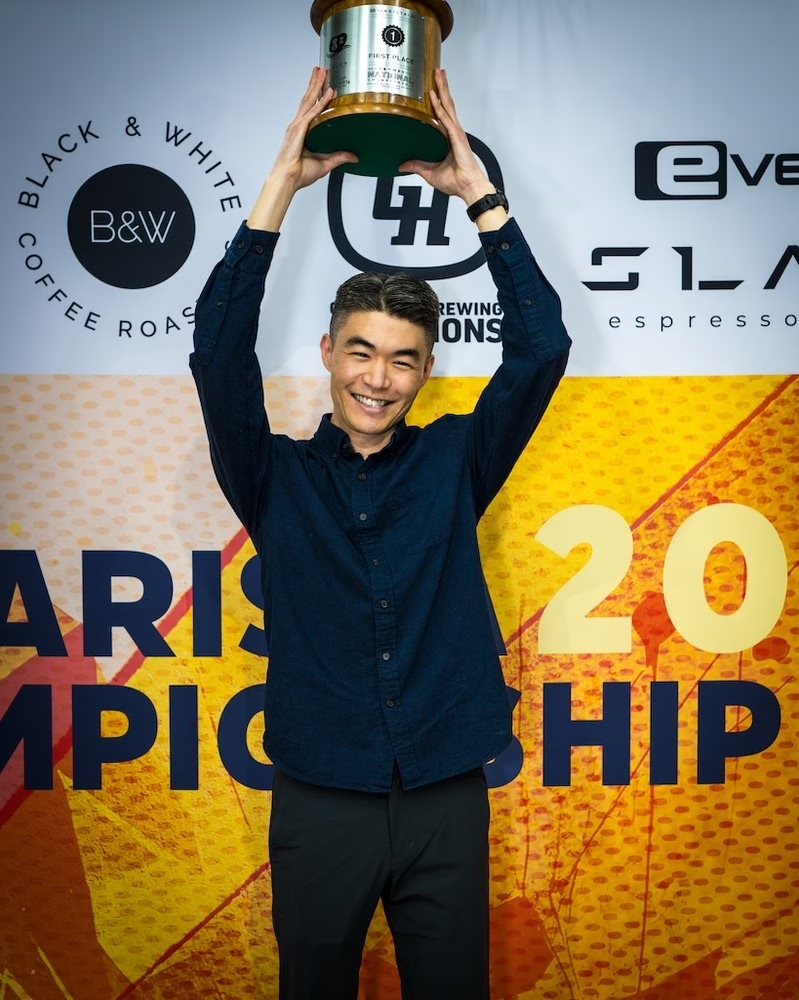
Kay’s strategy and perseverance paid off at the 2025 USBC, which took place March 6-9 in Raleigh, N.C. Using two coffees—a Gesha and an Ombligon—and structuring his routine around the building blocks of flavor, Kay, who continues to work for and represent Dune Coffee Roasters, earned the title of 2025 U.S. Barista Champion. He will now advance to the World Barista Championship (WBC), taking place October 17-21 in Milan, Italy.
In the first installment of this two-part interview, we talk to Kay about why barista competition interests him, how he built this year’s winning routine, and more.
Chris Ryan: First, how did you come to barista competition, and what were your early years like?
Kay Cheon: Before I began competing, I knew barista competition existed because there were competitors in my community that I knew of, or had seen their preparation. When I got to Dune, there was also a history of competition participation, and so long before I ever decided to compete myself, I understood that competition was out there and that it was such a high level of engagement with our industry.
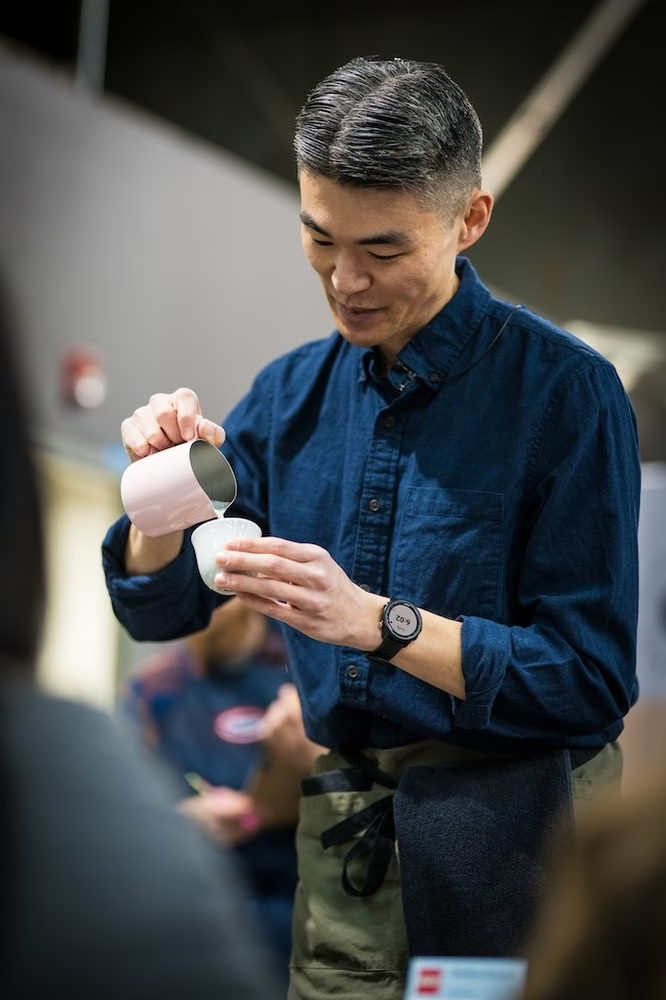
The first year that I competed in 2018, I had no expectations of how well I would do, and all I was hoping to get out of competing was to push myself to learn new things and grow my understanding of coffee. What I didn’t realize before that first year was also the community and structure that it takes for competition to exist, not to mention all of the learning and growth that comes with building a presentation for the national stage.
This year, you were the rare competitor to roast their own coffees for competition. Can you discuss the decision to do that, what it looked like in practice, and how it ultimately benefited your routine?
I’ve roasted coffees that I’ve served on stage before, but this was the first year that I sourced and profiled everything myself. Part of the reason was that I wanted to utilize a Stronghold roaster, which is a machine that Dune doesn’t have in the roastery. I was able to use a friend’s S7Pro roaster, but it did mean driving back and forth between Santa Barbara and L.A. (where the machine was located).
I knew I wanted to utilize the Stronghold in my preparation for multiple reasons: the batch size is a big advantage for competition coffees that typically are smaller lot sizes, but also all of the control the Stronghold gives you during the roasting process. There were a lot of new variables that I had to learn about, and I’m really grateful to Aaron Zhao and Ben Put for their help along the way in roasting.
Thanks to roasting on the Stronghold, I was able to bring a few different roasts and batches to USBC, which gave us the ability to fine-tune the coffee once we arrived to Raleigh. I actually had cupped all of the roasts that I would be bringing before we left, and I had a feeling that there was one roast that was tasting the best, and that we might be able to save it for finals if we made it through, which of course meant we were taking a risk if we didn’t use that coffee in semifinals and didn’t make it to finals. Thankfully, it worked out.
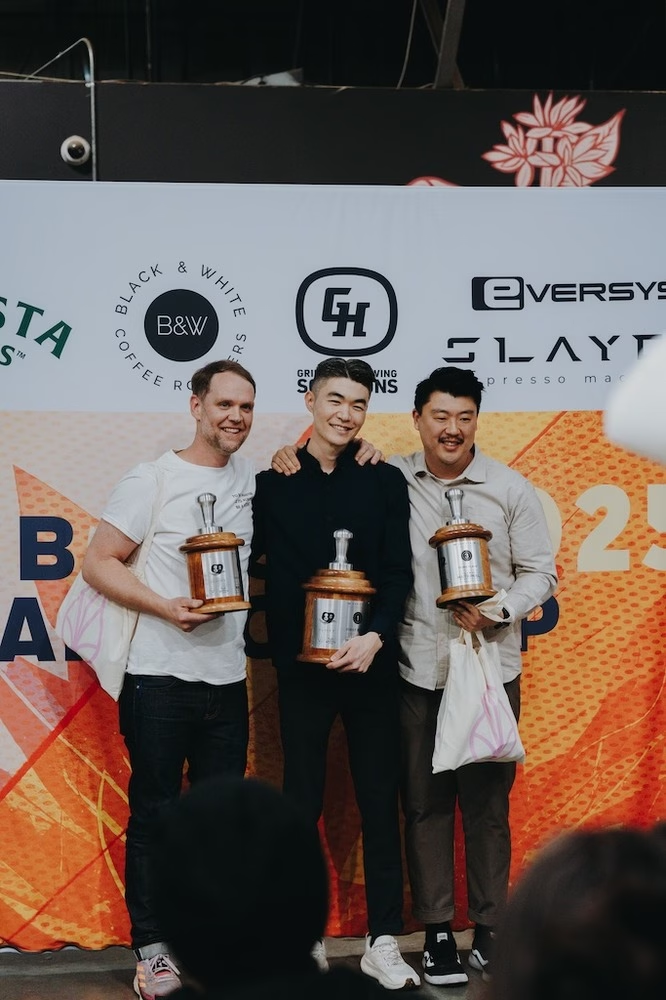
Can you talk about your coffee choices this year? I know the Gesha from Savage Coffees has historically performed well in competition. The Ombligon variety, which you sourced from El Diviso, seems less common in comps, but I know Frank La won with it last year. Why these two coffees for this routine?
I really try and taste as many coffees as I possibly can all the time, both thinking about coffees with competition potential, but also because I think that’s the best way to learn. Beginning in April 2024, I started tasting and sample roasting all of the coffees I could get my hands on—there are probably over 200 lots in a spreadsheet that we tried. There were a few coffees that really stood out to us along the way that we could have competed with, but with the building blocks presentation, serving both the El Diviso and Finca Deborah came together in a really great way.
I actually had some hesitation around competing with the Ombligon, given Frank’s success with it last year, and so I tasted that coffee multiple times. What convinced me is how exciting that coffee was to someone who hadn’t tasted it before; it’s so distinct in flavor, and I thought that might be a fun experience to get to share with the judges.
I spoke with Jamison (Savage, founder of Savage Coffees) a few times, and there’s a perspective that we shared: that your only competition is yourself, which I really aligned with. The coffees from Savage are incredible, and tasting through all of the different profiles, it became apparent to me to pick something that would work for my presentation and what I wanted to share. I served a natural yeast-inoculated Gesha at USBC, which had a really incredible tactile quality.
Stay tuned for part two of this interview later this week, where we’ll talk to Kay about winning the USBC, how he’s approaching the upcoming WBC, and more.
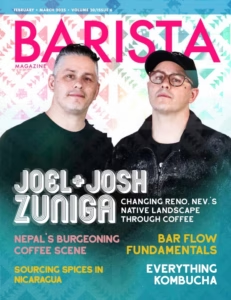
Subscribe and More!
As always, you can read Barista Magazine in paper or digital format. Subscribe here to get your own hardcopy of each issue delivered. Read the February + March 2025 issue for free with our digital edition.
And for more than three years’ worth of issues, visit our digital edition archives here.


